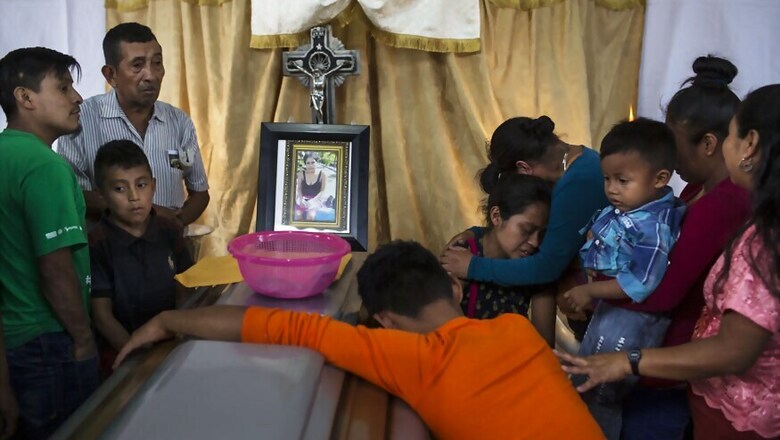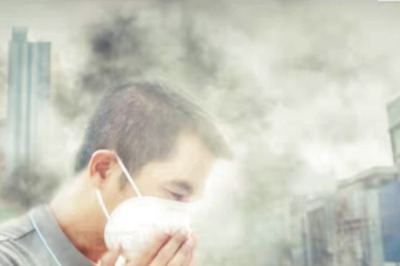
views
Guatemala: Estuardo Hernandez, a 19-year-old worker at a plant nursery in the nearby city of Antigua, is certain he knows where his parents are, and the knowledge is driving him to desperation. He's sure they are buried inside the home where he grew up, covered by ash and other debris that swept down the Volcano of Fire into this small community.
Lying on his stomach, he reaches into a narrow space left between the top of a window and the tons of ash now filling the one-story house. The ash is almost up to the roof, and his efforts are so futile he stops and weeps softly.
Guatemala's government suspended the search for the dead on Thursday, saying wet weather and still-hot volcanic material were too dangerous for rescuers. The bulldozers and backhoes that Hernandez would need to uncover his parents are at the bottom of the hill, concentrating on re-opening a highway blocked by a mountain of ash and boulders.
The government said at least 109 people were killed when the volcano exploded Sunday, and there are nearly 200 listed as missing. Relatives and friends have been left in many cases to continue searching with their hands or the few tools at their disposal.
Hernandez was talking to his father, Margarito Hernandez, on the phone when millions of tons of volcanic ash tore through San Miguel Los Lotes, a hamlet sitting on the volcano's slope.
"He called me at 3:13 p.m. Sunday," said the younger Hernandez, who was working in Antigua that day "The last thing he told me was to go far from here ... the last thing I could hear was him saying: 'Get inside! There's a lot of fire out there.' I say they stayed in the house."
Hernandez peers into the narrow open space and points to the back wall of the house, where the lahar hit the structure. "That's where they had the beds. I believe they went there."
In the four days since the disaster, no government official had even passed by to collect that information, or lend a hand, he said. "Without help we can't do anything ... the only thing that matters to the government is the highway. Why not bring machinery in here?"
A few houses down the slope, construction worker Alejandro Esqueque, 45, got tired of waiting for the government to recover the bodies of his mother, three brothers and four nieces and nephews. He organized a group of fellow construction workers and friends Thursday to dig with shovels into the house, which is filled to the roof with ash.
They made the most progress of any of the dozen families who defied police roadblocks to search on their own, and even they got only about three feet down into the mass of rapidly solidifying, still hot ash.
"We need a backhoe, but they (authorities) have to authorize it first and they don't give permission," Esqueque said.
He is sure his 69-year-old mother's body is inside, because she used a wheelchair and couldn't flee. He's also sure his siblings wouldn't leave her. "They would never want to leave my mom. They were always with my mom."
His only thought now: "Don't leave them here," he said with iron determination. "I'm not going to leave them here."
Guatemala's disaster agency, Conred, suspended the search several times this week, including for most of Thursday.
Volcanic activity dumped more than a foot of additional rock and ash on the search sites between Wednesday and Thursday. And officials worry downpours could destabilize slopes.
Francisco Chavez showed up early with two sons, without tools, to check a collapsed house for a missing son, Edgar Otoniel Chavez, his wife, Sandra Hernandez, and their 4-year-old, Josue.
At first they dug with bits of broken boards and sticks in the thick ash, now turned concrete-like by rain.
Eventually, a few police officers took pity, and instead of running them off, lent them shovels and helped them in the desperate task of digging.
But the huge ash field dwarfed their efforts, and the lack of government help angered them.
"They are cleaning the highway — the president has commitments to business people ... But here, since the people have nothing to offer him, he leaves this part as a burial ground," said one of the sons, William Chavez, a 29-year-old accounting student.
Anger was growing at President Jimmy Morales, who made only one brief visit Wednesday to the area. He didn't stop to talk to residents or reporters or offer much help. After a few minutes, his convoy sped off to a waiting helicopter.
"Why did the president come if he didn't bring anything?" said Gloria Esperanza Lopez, 35, who brought tamales to donate to residents and rescue workers, but wasn't allowed to pass a police checkpoint. "How could he come with empty hands when we come with at least a tamal?"
At a shelter set up in a school in the nearby city of Escuintla, Nohemi Ascon, 41, waited Thursday. She is the aunt of six children aged 1 to 8 who died in Los Lotes. A photograph taken shortly after the disaster showed their bodies huddled together on a bed in the corner of a room, covered in white ash and blood.
She said other relatives are missing.
"My father, my mother, my sisters are there," she said, upset over the decision to again suspend the official search. "It is their job. It is not right that they leave them there. They should get them out so we can take them to the cemetery."













Comments
0 comment